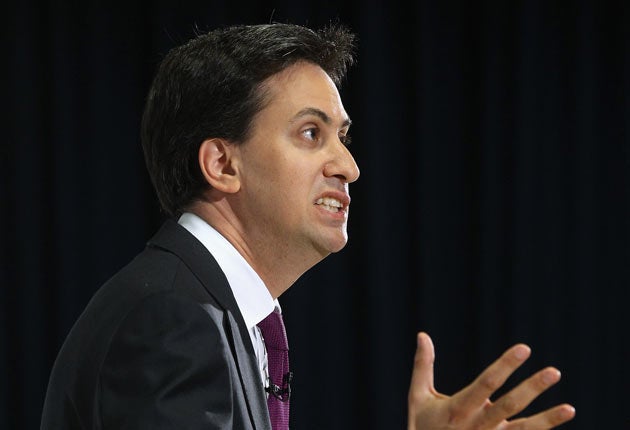Miliband needs to tell us much more about his mission

My abiding image of Ed Miliband's first year in his job is a speech he made in January.
Before he came to the important bit – an admission of some of Labour's mistakes in office – Sky News decided it was too boring and pulled the plug. Presenter Colin Brazier said he was "trying to digest, and really understand what, through the coded language, Ed Miliband was saying".
For some reason, the moment has stuck in my mind. Perhaps because it is symbolic. The Labour leadership believes it has said enough about its past record. But, like that Sky audience, I am not sure the public has really heard the party's "mea culpa".
That is a problem, because the Conservatives and Liberal Democrats have persuaded the voters that the previous Labour Government should take the blame for the deficit. Labour insists Britain's deficit was caused by a global crisis, not by spending more on schools and hospitals. But some senior Labour figures worry that the party's attempts to regain economic credibility are being hindered by a refusal to go further in admitting its past errors.
However, events may finally be easing the pressure on Mr Miliband. Until recently, the political argument over who caused the deficit was at the forefront of the debate. Now the gathering global storm means that economics is to the fore. That has shifted the spotlight to George Osborne's strategy. With fears of a double-dip recession rising, Labour's argument that the Coalition is cutting "too far, too fast" no longer looks wide of the mark. It might even become the received wisdom.
Yet Labour still needs to define what it stands for and what its still largely unknown leader is about. To be fair, since that false start in January, Mr Miliband's chosen three themes have all come good. His talk of a "squeezed middle", the millions struggling with falling living standards, was ridiculed but is now the political battleground. It helps Labour to occupy what it calls the "new centre ground."
This is not, as some Blairites fear, an attempt by Mr Miliband to veer off to the left. It is based on his belief that the gap which matters today is not between the top and the bottom but the top and the rest. This links into Miliband theme number two – the need for responsibility both at the top (bankers, company bosses) and the bottom (welfare claimants, rioters).
His third theme is what Mr Miliband calls the "British promise." He argues that one consequence of the "quiet crisis" going on as hard-working families try to survive the squeeze, is that for the first time in a century, the next generation may not be better off than the current one. To stop that happening, he will argue that the "rules of the game" (a favourite phrase) must change. He will claim that Britain took a wrong turn, not in the 13 years of Labour rule, but in the free-market economic orthodoxy of the last 30 years.
He will argue that the Coalition is now repeating the mistakes – for example, regarding the Holy Grail of economic growth as separate from cutting the deficit rather than a means of reducing it (through higher tax revenues and lower benefit bills).
The theme of the Labour conference in Liverpool, which starts tomorrow, is "fulfilling the promise of Britain". As well as playing the generation game, that allows Labour to strike a positive note about the future, Mr Miliband will deny David Cameron's post-riots claim that British society is "broken". He will argue that there is nothing wrong with the values of British people and say they are held back by a broken economic system.
In his all-important speech on Tuesday, Mr Miliband's task will be to weave his three themes into a message voters will hear, understand and buy. It is unfair to label his first year as a wasted one, but he could have moved more quickly.
He will argue that he has been listening to people and is now ready to signpost his new economic settlement, outlining policies to help young people and tackle "irresponsibility" at the top and bottom of society.
I suspect that we will know quite a bit more about Mr Miliband and his Labour mission by Tuesday evening. And not before time.
Subscribe to Independent Premium to bookmark this article
Want to bookmark your favourite articles and stories to read or reference later? Start your Independent Premium subscription today.

Join our commenting forum
Join thought-provoking conversations, follow other Independent readers and see their replies